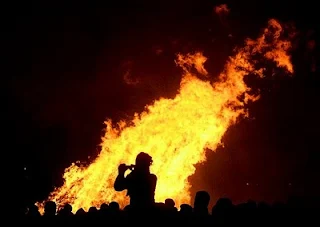I've written about Mr De Quincey before which you can find below at following link.
teifidancer: THOMAS DE QUINCEY and his phantasmagoric dreams. In 1807 he went to visit the lake District, where he became friends with the poet William Wordsworth. In 1809 he settled in Grasmere, at Dove House which had previously been Mr Wordsworth's home. He was to stay there for ten years. Thomas had long been an admirer of Williams work, and for a while their was a lot of mutual respect, becoming friends with Wordsworth's sister Dorothy and a number of his acquaintances who became known as the lake poets, including Coleridge and Robert Southey. However over the years there was to be a gradual falling out, over some real or imagined state. It has been mentioned that de Quincey thought that Wordsworth had been ungenerous towards him, though he had a tendency to think that, of a lot of people. De Quincey's head at the time had more than just a claustophobic edge to it , by this time he was using opium daily to relieve the products of social restraints that he felt, and was often to be found wandering in much a delirious state, delivering a number of public spats, that were to become the stuff of legend.
Later he wrote this essay,in which he achieved some sort of public revenge by drawing this pen picture of his ex-friend on a Nature Ramble. It has more than a bite to it.
William Wordsworth

'Wordsworth was, upon the whole, not a well-made man. His legs were pointedly condemned by all the female connoisseurs in legs that ever I heard upon that topic; not that they were bad in any way which would force itself upon your notice - there was no absolute deformity about them; and undoubtedly they had been serviceable legs beyond the average standard of human requistion, for I calculate, upon good data, that with these identical legs Wordsworth must have traversed a distance of 175 to 180,000 English miles - a mode of exertion which to him, stood in the stead of wine, spirits, and all other stimulates whatsoever to the animal spiris; to which he has been indebted for a life of unclouded happiness, and we for much of what is most excellent in his writings. But, useful as they they have proved themselves, the Wordsworthian legs were certainly not ornamental, and it was really a pity, as I agreed with a lady in thinking, that he had not another pair for evening dress parties - when no boots lend their friendly aid to masque our imperfectations from the eyes of female rigorists - the
elegantes formarum spectrices. A sculptor would certainly have dissaproved of their contour . . .
But the worst part of Wordsworth's person was the bust: there was a narrowness and a droop about the shoulders which became striking, and had an effect of meanness which brought into close juxtasposition with a figure of a most statuesque order. Once on a summer morning, waliking in the vale of Langdale with Wordsworth, his sister,and Mr J - a native Westmoreland clergyman, I remember that Miss Wordsworth was positively mortified the peculiar illustration which settled upon this defective conformation. Mr J -, a fine towering figure, six feet high, massy and columner in his proportions, happened to be walking, a little in advance, with Wordsworth and myself being in the rear; and from the nature of the conversation which then prevailed in our front rank, something or other about money, deviceses, buying and selling, we of the rear-guard thought it requisite to preserve this arrangement for a space of three miles or more; during which time, at intervals, MissW - ould exclaim, in a tone of vexation, 'Is it possible? can that be William? How mean he looks!'' and could not conceal a mortification that seemed really painful, until I, for my part, could not forbear laughing outright at the serious interest which she carried into this trifle. She was however, right as regarded the mere visual judgement.
Wordsworth's figure, with all its defects, was brought into powerful relief by one which had been cast in a more square and massy mould; and in such a case it impressed a spectator with a sense of absolute meaness, more especially when viewed from behind, and not counteracted by his counterance; and yet Wordsworth was of a good height, just five feet ten, and not a slender man; on the contrary, by the side of Southey his limbs looked thick, almost in a disproportionate degree.
But the total effect of Wordsworth's person was always the worst in a state of motion; for, according to the remark I have heard from country people, 'he walked like a cade' - a cade being some sort of insect which advances by an oblique motion ( 'a cade'was, in fact, the country word for a tottering, new-born lamb: perhaps slightly preferable from Wordswort's point of view to an ant). This was not always perceptible, and in part depended (I believe) upon the position of the arms; when either of these happened (as was very customary) to be inserted into the unbuttoned waistcoat, his walk had a wry or twisted appearance only - for I have known it, by slow degrees, gradually to edge off his companion from the middle of the side of the highroad.
From
Recollections of the Lakes and the Lake Poets
- Thomas de Quincey 1840.









.jpg)
